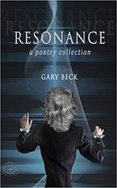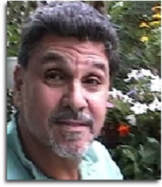 Today, my review of his latest collection, Tremors, is available to read at Bewildering Stories. Gary was kind enough to answer a few questions about his love of literature, his journey to writing, and what informs his process of creativity. Welcome, Gary, and thank you for joining me to talk about your writing. I first chatted with you over a year ago when I became the Book Reviews Editor for the online magazine Bewildering Stories. Since then, I’ve read and reviewed a number of your poetry collections for the magazine, and I really enjoy your style and imagery. In my latest review of your recent release Tremors, I don’t think I’m amiss in labeling you as prolific. What got you started writing, and from where do you draw your inspiration? My pleasure, Alison. At the age of 16 I fell in love with the British Romantics, Byron, Keats, Shelley and began writing spirited imitations that weren't any good. The American poets were far more meaningful to me and I read lots of them, Whitman, ee cummings, I could go on... I stole from lots of them. I read the French Symbolists in French and was frustrated that I couldn't read Pushkin and Lermontov in the original. I started exploring my own voice and tried various modes of expression, but always passionately. I started writing short stories, but my work in theater was so time consuming that I wasn't able to start longer forms. I have done many different things and lived in different worlds, but directing was my first love. I got involved with working with troubled youth and my detestation of a system that threw away so many children permeated my poetry. Many editors don't see the craft in my work built over so many years and only see issues that they don't care for. I've been fortunate that a number of editors recognize what I'm trying to accomplish and you're one of them. Your poetry is rich and layered, and easy to appreciate. I actually feel guilty for asking you the question about inspiration, because it’s a question I have a hard time answering myself. Everything can be inspiration, from other writers to everyday experiences. I sometimes feel I have too many story ideas and not enough hours to write them. How do you find the time to write all that you do? Are you a full time writer now or do you still work in theater, with troubled youth, and follow your Muse after hours? You can never have too many ideas. Just write them down and possibly you'll get to them. My theater closed in 1996. I had been working 14 to 16 hours a day, 7 days a week running an ongoing theater company, an arts and education program for youth (for 25 years) in a Bronx public housing development, a prison youth program and an arts and life skills program for homeless families with children that started as an outreach program to welfare hotels, then moved to our theater with a computer learning center and an official social services component for 25 families and another 30 or 40 unofficially. Whew! And this is only the tip of the iceberg. My commitment was virtually all consuming. I was the artistic director, executive director, translator of the Italian, French and Greek classics we produced, a playwright of social issue dramas, the director of all our productions, an award winning video documentary and short film maker... I could go on, but I think you'll get the picture. I also managed to write poetry. When my theater closed I had an incredible amount of time to write novels, poetry, short stories, essays, one-act and full length plays and got more and more published. I still mentor two formerly homeless youth who came to me when they were 11 and are now 40. I write every day believing Tolstoy's dicta—I write when the spirit moves me and the spirit moves me every day. I'm old, in poor health, yet I have a lot more work to do as I try to build an audience concerned with the issues of our times. I’m really sorry to hear about your health issues. But after all you were doing, it’s no wonder that you don’t find writing so tough. What are your favorite genres to write? To read? Are there any genres you feel hesitant about trying your hand at, or is anything fair game? No need to be sorry. I've had a very full life and try to savor every day. I enjoy all the genres I write in. I am comfortable with any format and well experienced in all of them. Each genre is distinctly different and rewarding and I get satisfaction from all, my favorites, poetry and playwriting. I tend to read a lot of poetry in the magazines that publish me, and there are a lot of them. I'm generally working on a novel and poetry collection at the same time, with excursions into other formats regularly. My reading preferences are for the classics, poetry and drama. You mentioned you write every day. I tend to squeeze in writing when I can, because of my kids. I know writers who can only write outdoors, in longhand, or at night. Do you have a set schedule/place/mode of writing? What’s a typical writing day look like for you? I must confess I occasionally miss a day working on the current novel, then I atone for my negligence by writing a short story, essay, or one-act play. My two major commitments are to novels and poetry collections. I've been writing both non-stop for quite a while now. (I do have folders of material that I'll never get to, except for periodic checks when I pull out a few things). I work on the novels in the morning (two or three mornings a week I play speed chess in Bryant Park, when I'll write there before I play). I work on poetry and other forms late afternoons or early evenings. I am securely rooted in my work process and can write almost anywhere, as long as I'm not being waterboarded. Ah, that's interesting that you play chess - I don't remember reading any poems relating to the game in your recent collections. Of course, I might be mistaken, since I have a bad memory. I often have to find ways to compensate for my memory by having a pretty detailed organizational system when it comes to my own work. How do you keep yourself organized with so many different magazine submissions/manuscripts/publications? How many publications do you have at this point, or have you lost count?  I wrote a one-act play about chess and a short poem that's in an earlier collection. I'm very fortunate that my brother functions as my literary manager and does a prodigious amount to help with my work and get me published. I keep Manila folders of completed work that hasn't been published and there's a lot, novels, poetry collections, short stories, essays, plays. Published books are on shelves. Future projects and current projects are in folders. I've had 12 poetry books published, 11 chapbooks, 5 novels, a short story collection, over 2,000 poems, dozens of short stories, essays and one-act plays. A poetry book, Virtual Living, came out last week. A poetry book, short story collection and a novel are scheduled for this year, and so far two poetry collections and a novel for next year. I'm publishing more and more, but I have many unpublished manuscripts and a desperate need for a bigger readership. That is an impressive resume. It's wonderful that your brother is able to help you out - I need a brother like that! :) Is there any piece of advice you would give to aspiring writers that you wish someone had told you at the start of your career? If you can afford it, I'll rent mine to you part-time. I never got any advice when I was young, and if I did I wouldn't have listened. I was a know-it-all and learned everything the hard way, by frequently reinventing the wheel. Young writers don't have to make life determining decisions, unless they are burning and possessed beyond redemption. I used to tell young, serious stage actors, find some way to support yourselves, because it'll be a long time, if ever, that you make a living in Theater. If young writers want to write for television, then they have to learn their trade. If they want to write literature, they better prepare for a long grind, except if they network. If they believe in themselves and persevere, they may not get anywhere, but they'll produce the work they aspire to. Despite the proliferation of emags, literature, like all the arts in America is in decline. A handful of commercial fiction writers make money. Most established poets are cloistered in a college or university. We no longer seem to have a climate to produce great writers. As parents used to tell their children once upon a time who wanted to be actors, before college made it a respectable calling, get a good career. Unless you are driven, compelled, consider it a brief adventure, then move on. I agree that persevering is the key to getting better at the craft. I sometimes shudder at writing that I produced ten, twenty years ago - there was a reason I didn't get many publications until recently. Speaking of recent/new publications, you mentioned earlier you have three more books scheduled to be published this year and two for next year – can you tell me a little bit more about your pending books? I must confess I’ve only read your poetry and not your short stories or novels. A suggestion. Never judge your work. Many others are all too willing. If you have to write, do it and keep doing it until you're through, whenever or whatever that is. It is effortless to be a self critic, a useless exertion. The three books coming out this year are Perturbations, a poetry collection from a brief transitional period, when I wrote about diverse topics as well as issues. Perturbations will be published soon by Winter Goose Publishing, an exceptional small press, with a very fine publisher and editor, who,published 8 of my poetry collections. Now I Accuse and other stories (also to be published by Winter Goose) has a selection of stories from the last 10 years about the travails of theater people, comic and tragic encounters of people in all walks of life, using different styles and techniques. State of Rage, a novel about one man’s quest to prevent the mad rampages that attack schools, the workplace and public places, will be published by Rainy Day Reads Publishing. Two poetry collections are scheduled for 2018 (both by Winter Goose). Rude Awakenings is a little more intimate than usual, with personal feelings about love, struggles to attain goals, the search for understanding and brief portraits of individuals. The Remission of Order takes a world view of war, the nature of democracy, how Americans are betrayed by the system, how so many of us strive for a better life. Another novel, Crumbling Ramparts, a sequel to Call to Valor, published by Gnome on Pig Publishing, will be released by the same Canadian publisher in 2018, or 2019. This follows some dedicated Marines who prevent a nuclear attack on America and go on to better protect the homeland from enemies foreign and domestic. Gary, I want to thank you so much for chatting with me! It was great to learn more about you and your writing.
0 Comments
Leave a Reply. |
Who the heck is Alison McBain?I am a freelance writer and poet with over two hundred short pieces published in magazines and anthologies. Check out my 2024 writing challenge to write a book a week at Author Versus AI. For more info, please check out my "About Me" page. © Alison McBain. All rights reserved
Archives
July 2024
|





